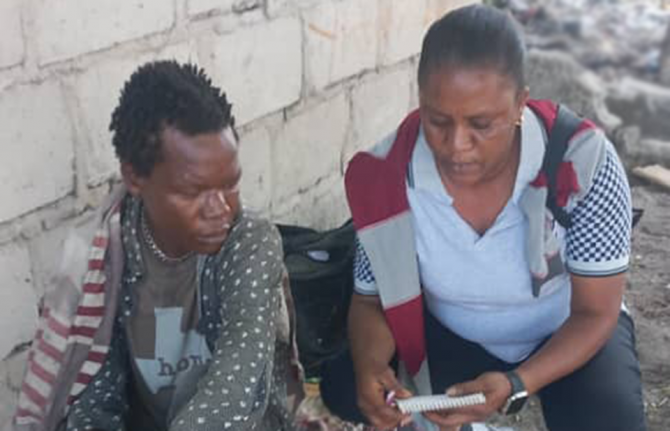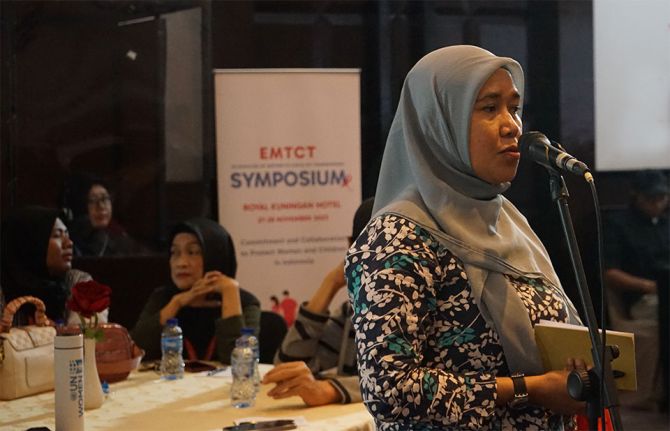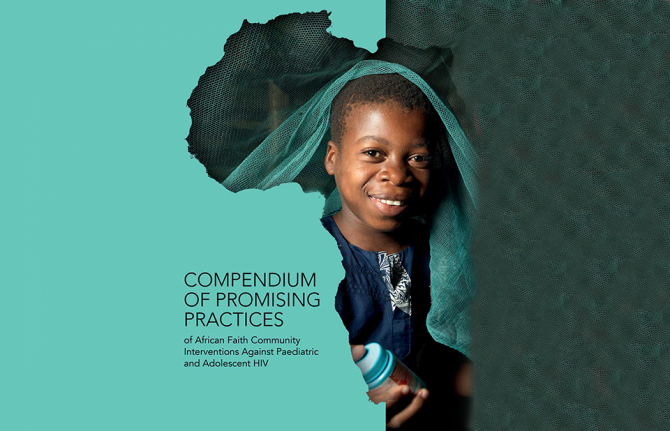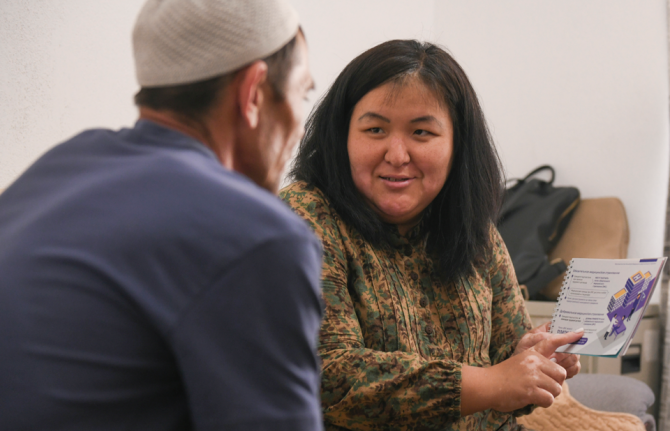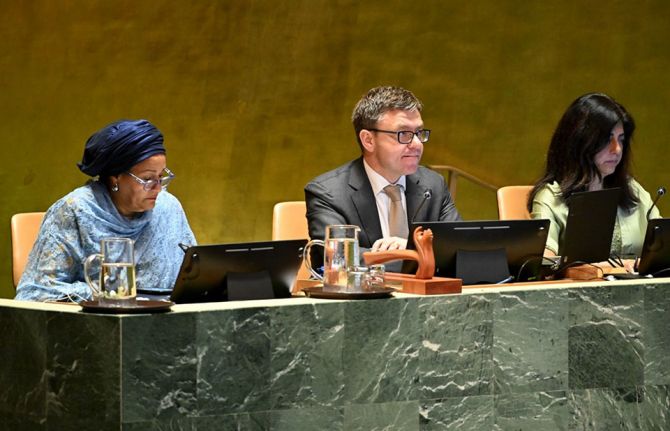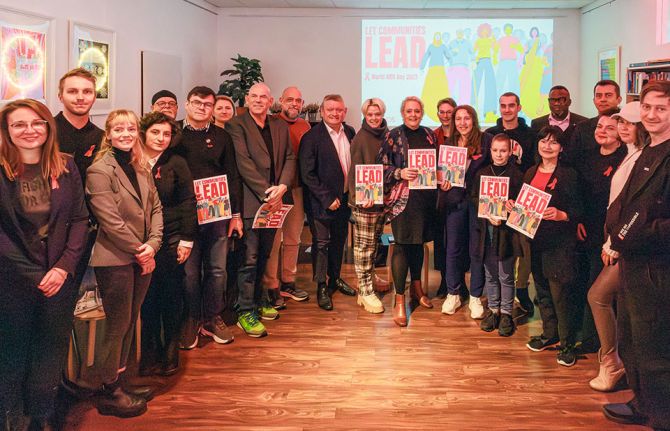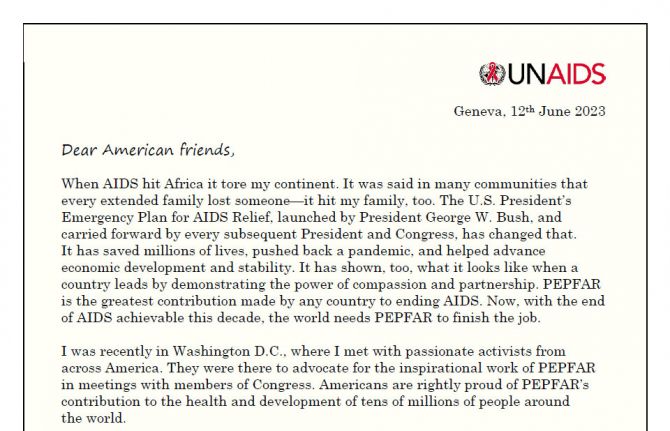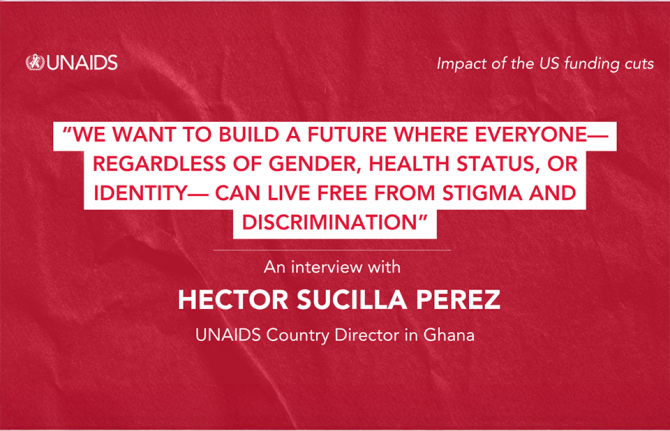
Feature Story
No African child should be born with HIV by 2015
20 April 2010
20 April 2010 20 April 2010
During an official visit to Senegal, the UNAIDS Executive Director Michel Sidibé (left) was received by the President, Mr Abdoulaye Wade on 19 April.
During an official visit to Senegal, the UNAIDS Executive Director was received by the President, Mr Abdoulaye Wade on 19 April. Mr Sidibé thanked President Wade for taking the initiative to include an important item on the agenda of the African Union Summit in July 2010 in Kampala, Uganda, titled “Accelerating measures on HIV and MDGs: Partnership to Eliminate Mother-to-Child Transmission of HIV in Africa.” The Executive Director noted that HIV has been the major cause of child and infant mortality in major parts of Africa, with about 390,000 children under 15 newly infected with HIV in 2008 alone.
Mr Sidibé also thanked President Wade for the successes recorded by his country in the fight against HIV in general and in the eradication of vertical transmission from mother to child in particular.
In response, President Wade assured Mr Sidibé that “Senegal will work with UNAIDS towards the goal of zero new infections in Senegalese children by 2015.”
Mr Michel Sidibé was in Dakar, Senegal, to take part in the UNAIDS Sub-Saharan Africa Regional Management Meeting, with the aim of leveraging HIV for broader health and development outcomes in Africa and to discuss Senegal’s progress on universal access with its authorities.
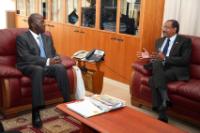
UNAIDS Executive Director Michel Sidibé (right) also met the Prime Minister of Senegal, Mr Souleymane Ndéné Ndiaye, who reaffirmed Senegal’s commitment to total eradication of mother-to-child transmission.
Mr Sidibé also met the Prime Minister of Senegal, Mr Souleymane Ndéné Ndiaye, who reaffirmed Senegal’s commitment to total eradication of mother-to-child transmission. He said that “the prevention of new infections should be a priority for all African countries.”
During his visit, Mr Sidibé noted that a lot of progress had been made in the AIDS response in Africa. “In 2008, about 45% of pregnant women living with HIV in this region were receiving antiretroviral drugs to prevent transmission to their children, up from 35% the previous year. Tens of thousands of new HIV infections have been prevented as a result of prevention programmes and the efforts of African governments, civil society and youth,” said Mr Sidibé. Yet despite progress, many challenges remain that prevent people from accessing the HIV prevention and treatment services they need, he added.
No African child should be born with HIV by 2015
External links:
Related

Feature Story
UNODC project provides cross-border HIV services to Afghan injecting drug users
16 April 2010
16 April 2010 16 April 2010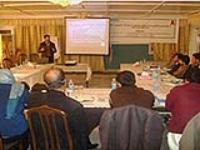
To help successfully implement the project and build the capacity of NGO staff and government officials, five days of training in HIV took place in Kabul.
Credit: UNODC
Providing comprehensive HIV services for injecting drug users is critical to an effective HIV response. In recognition of this, the United Nations Office on Drugs and Crime (UNODC) has begun to support the implementation of an initiative to make services accessible to Afghan refugees who inject drugs in Iran and Pakistan, and also to Afghan injecting drug users who have returned home.
The use of non-sterile injecting drug equipment is one of the most efficient modes of HIV transmission and remains one of the critical activities fuelling HIV epidemics among drug users. HIV can also spread from people who inject drugs to their sexual partners and other populations at higher risk of HIV exposure such as sex workers.
The project aims to create an environment that supports a cross-border regional network of HIV services so that Afghan refugees will be able to access HIV services when they go back to their country. UNODC awarded two grants to non-governmental organizations to provide services to Afghan drug users in Herat province, bordering Iran and Nangarhar, which borders Pakistan.
Khatiz Organization for Rehabilitation in Herat and the Health and Social Development Organisation in Nangarhar are using mobile outreach units to offer a wide-ranging set of servcies. These include facilitating specific information and education materials for drug users; distributing clean needles and syringes; promoting and distributing condoms; treating and helping prevent sexually transmitted infections; primary healthcare such as HIV voluntary counseling and testing services and antiretroviral treatment.
Training in HIV and drug use
To help successfully implement the project and build the capacity of NGO staff and government officials, five days of training in HIV took place in Kabul. Doctors, nurses, social workers, project managers and employees from the women’s prison participated.
During the meeting, also attended by high-level delegations from the government, UN agencies and NGOs, the seriousness of the situation in Afghanistan was discussed. Dr.Mohammad Zafar, Deputy Minister of Counternarcotics, told the gathering that according to a 2005 UNODC survey, the country has one million drug users, including 19 000 – 25 000 who inject drugs, making up 3.8% of the total population.
According to Dr.Ajmal Sabaoon, National AIDS Control Programme Manager, Afghanistan is moving from a low-level HIV epidemic towards a concentrated epidemic. He briefed participants on results of an Integrated Biological and Behavioral Survey conducted by John Hopkins University in 2009, which indicates that HIV prevalence among injecting drug users in three major cities of the country (Kabul, Herat and Mazar) has increased from 3% to 7% from 2007 to 2010.
Knowledge of HIV among IDUs is also very low. According to the study, only 29 % of the IDUs could correctly identify ways of preventing the sexual transmission of HIV and reject major misconceptions about HIV transmission. About 22 % of the IDUs have ever tested and know their HIV status.
The surveyed injecting drug users are known to be mobile, as almost 80% reported that they had changed residence at least once. Much of the mobility appears to be related to various phases of the conflict in the country, with the majority of IDUs relocating to Pakistan or Iran. The UNODC and its partners hope that by providing HIV services to injecting drug users in such bordering locations will help reverse the growing HIV prevalence among IDU in the country as well as within the sub regional area.
Protecting drug users against HIV is one of the nine priority areas in the UNAIDS Outcome Framework 2009-11. This can be aided by making comprehensive, evidence-informed and human-rights-based interventions, such as harm reduction and demand reduction, accessible to all who need them.
UNODC project provides cross-border HIV services
Cosponsors:
Speeches:
Read UNAIDS Executive Director's speech at the 53rd session of the Commission on Narcotic Drugs (10 March 2010)
Feature stories:
Call for urgent action to improve coverage of HIV services for injecting drug users (10 March 2010)
International Harm Reduction conference opens in Bangkok (20 April 2009)
OPINION: HIV and drugs: two epidemics - one combined strategy (20 April 2009)
UNODC and Iran sign agreements to reduce vulnerability of women and Afghan refugees to drugs and HIV (24 March 2009)
Injecting drug use and HIV: Interview with UNAIDS Team Leader, Prevention, Care and Support team (11 march 2009)
Opinion: Silence on harm reduction not an option (11 March 2009)
External links:

Feature Story
New study shows significant drop in maternal deaths
14 April 2010
14 April 2010 14 April 2010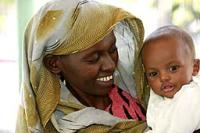
A new report published in the medical journal The Lancet found that, for the first time in decades, the number of women dying each year from pregnancy and childbirth has significantly drop. Credit:UNAIDS/P.Virot
A new report published in the medical journal The Lancet found that, for the first time in decades, the number of women dying each year from pregnancy and childbirth has significantly dropped. Researchers estimate that maternal deaths fell from 526 300 in 1980 to 343 900 in 2008.
UNAIDS Executive Director Michel Sidibé has welcomed the findings of the new report while attending the Launch Meeting of the Secretary-General’s Joint Effort on Women’s and Children’s Health. The two-day meeting brings global health leaders together to generate consensus as well as to plan measures to achieve the Millennium Development Goals 4 and 5.
The report, carried out by the University of Washington and the University of Queensland and funded by the Bill & Melinda Gates Foundation, highlights that progress in reducing maternal mortality has been slowed by the ongoing HIV epidemic. Nearly one out of every five maternal deaths— a total of 61,400 in 2008—can be linked to HIV, and many countries with large populations affected by HIV have had the most difficulty reducing their maternal mortality ratio. In South Africa, more than 50% of all maternal deaths are linked to HIV.
This study serves as a powerful reminder that progress in maternal health efforts is hugely dependent on progress in the AIDS response in countries with the most severe HIV epidemics.
UNAIDS Executive Director Michel Sidibé
“This study serves as a powerful reminder that progress in maternal health efforts is hugely dependent on progress in the AIDS response in countries with the most severe HIV epidemics,” said Mr Sidibé.
Mr Sidibe emphasized the UNAIDS pledge to continued support for the virtual elimination of mother-to-child transmission as outlined in its Outcome Framework 2009 - 2011. He also highlighted UNAIDS' commitment to ensure women living with HIV have access to treatment before and after birth to guarantee that newborn babies are not infected with HIV and mothers stay healthy.
Evidence shows that timely administration of antiretroviral drugs to HIV-positive pregnant women significantly reduces the risk of HIV transmission to their babies; it is a proven, inexpensive, and effective intervention. However, at the end of 2008, only 45% of HIV-positive pregnant women received the necessary treatment in low- and middle-income countries. Progress in this area can only be achieved by improving the quality of data and by integrating programmes which prevent the transmission of HIV from mothers to their children into the broader reproductive health agenda.
New study shows significant drop in maternal deat
Press centre:
UNAIDS welcomes new data showing fewer women dying each year from pregnancy and childbirth
Feature stories:
Global Fund projects that UNAIDS’ call for elimination of mother–to-child HIV transmission by 2015 is within reach (08 March 2010)
UNAIDS takes action to empower women and girls to protect themselves from HIV (02 March 2010)
Data shows progress needed on HIV testing and treatment for children and mothers (30 November 2009)
Related

Feature Story
UNICEF Executive Director launches 'Facts for Life' in Lesotho
12 April 2010
12 April 2010 12 April 2010A version of the story was first published at unicef.org
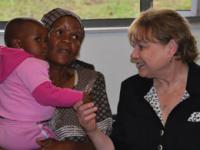
Ann M. Veneman visits clients at a children's clinical centre built by Baylor College of Medicine and Bristol-Myers Squibb in Maseru, Lesotho, where paediatric and family HIV care and treatment services are provided to young children and their caregivers.
During a recent visit to Lesotho, UNICEF Executive Director Ann M. Veneman launched Facts for Life, a publication that delivers life-saving information to families and communities on how to prevent child and maternal deaths, diseases, injuries and violence.
“Education is key”, said Ms Veneman. “Through simple messages, Facts for Life aims to bring vital knowledge to parents and caregivers, who are the first line of defence in protecting children from illness and harm.”
Circulated worldwide
Some 15 million copies Facts for Life have reached billions of people since its first publication in 1989. It is a co-publication by UNICEF, WHO, WFP, UNESCO, UNFPA, UNDP, UNAIDS and the World Bank, and provides practical advice on pregnancy, childbirth, major childhood illnesses, child development, early learning, parenting, protection, care and support for children.
New chapter on child protection
The publication includes a chapter on managing HIV. It promotes early diagnosis in children, effective treatment and anti retroviral therapy when prescribed. Currently most HIV-positive children are given such treatment after the age of five, when it might be too late. Without treatment, half of all babies born with HIV will die before their second birthday.
“One in ten children in Lesotho does not survive to see his/her fifth birthday, most as a result of AIDS and preventable causes like pneumonia and diarrhea, exacerbated by malnutrition” said Ms. Veneman, “Facts for Life can help bridge the information gap that contributes to the needless death of millions of young children.”
The publication also contains a new chapter on child protection, which provides information on keeping children safe from violent and harmful behaviours and practices.
“Girls and boys must be protected from violence and abuse,” said the Executive Director. “Protecting children so that they can grow up in safe environments and reach their full potential can help break the cycle of poverty.”
UNICEF Executive Director launches 'Facts for Lif
Cosponsors:
United Nations Children’s Fund (UNICEF)
World Health Organization (WHO)
World Food Programme (WFP)
United Nations Educational, Scientific and Cultural Organization (UNESCO)
United Nations Population Fund (UNFPA)
United Nations Development Programme (UNDP)
World Bank
Partners:
Unite for Children, Unite against AIDS
Feature stories:
Global Fund projects that UNAIDS’ call for elimination of mother–to-child HIV transmission by 2015 is within reach (08 March 2010)
Data shows progress needed on HIV testing and treatment for children and mothers (30 November 2009)
More infants protected from HIV as access to antiretroviral drugs to prevent mother-to-child transmission increases (30 September 2009)
Early diagnosis and treatment save babies from AIDS-related death (27 May 2009)
Contact:
Roshan Khadivi,
UNICEF New York
Tel + 1 212 326 7270, rkhadivi@unicef.org
Publications:
Facts for Life
Children and AIDS, Fourth Stocktaking Report, 2009 (pdf, 5.04 Mb.)
Children and AIDS, Fourth Stocktaking Report, 2009: Summary (pdf, 781 Kb.)
Related

Feature Story
Haiti civil society brief US government on AIDS needs
09 April 2010
09 April 2010 09 April 2010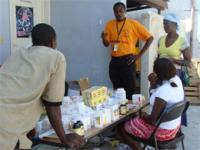
Functioning ARV dispensing site in Port-au-Prince after the devastating 12 of January earthquake. Credit: UNAIDS
Haitian civil society representatives visited Washington, D.C. on 6 April to mobilize political support for reconstructing the AIDS response in Haiti.
The civil society delegation, with support from UNAIDS, gave a testimony of their experiences with the earthquake and highlighted the importance of reconstructing the AIDS response with direct involvement of affected communities, especially people living with HIV. The briefing was held at Capitol Hill during a US Congressional briefing sponsored by US Senator Kirsten Gillibrand (D-NY) and attended by congressional staff, AIDS advocates and US civil society representatives.
Later that same day, the delegation from Haiti visited US Global AIDS Coordinator Ambassador Eric Goosby and his colleagues from USAID. The US government team pledged its support to encourage the Haitian government to include the involvement of people living with HIV in planning the reconstruction of the AIDS response in Haiti.
On 24 March, US President Obama asked the US Congress to approve $2.8 billion as an emergency requirement for relief and reconstruction support for Haiti following the devastating earthquake of 12 January 2010. The request is now pending before US lawmakers who will very soon vote on the proposal.
There were an estimated 120 000 people living with HIV in Haiti before the earthquake. Most of the structural damage happened in the three departments (Ouest, Sud-Est and les Nippes) that accounted for nearly 60% of the population of people living with HIV.
Following an initial rapid assessment of the situation with the Ministry of Public Health and Population, UNAIDS released a concept note Helping Haiti rebuild its AIDS response. The report explains the current situation in Haiti and what may be required to meet the immediate and intermediate AIDS response needs.
Civil society networks of people living with HIV as well as many of the organizations providing HIV services have been affected by the earthquake and are in need to be strengthened.
Haiti civil society brief US government on AIDS n
Feature stories:
Building Haiti’s AIDS Response Better (29 January 2010)
The UN stands as one in solidarity with people affected by Haiti Earthquake (14 January 2010)
Publications:
Helping Haiti build its AIDS response (2010) (pdf, 2.21 Mb)
Related

Feature Story
Ahead of XVIII International AIDS Conference UNAIDS Executive Director visits Vienna
08 April 2010
08 April 2010 08 April 2010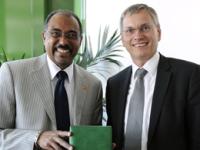
Austria’s Minister of Health Alois Stöger, (right) met UNAIDS Executive Director Michel Sidibé in Vienna, 7 April 2010. Credit: UNAIDS
During an official visit to Vienna, UNAIDS Executive Director Michel Sidibé met with high-ranking government representatives of Austria, including the Minister of Health Alois Stöger, Executive City Councillor for Public Health and Social Affairs of Vienna Sonja Wehsely, as well as Her Excellencies Ambassadors Irene Freudenschuss-Reichl, Director General of the Department of Development Cooperation at the Ministry of Foreign Affairs of Austria and Brigitte Öppinger-Walchshofer, Director General of the Austrian Development Agency.
The visit acknowledged the strengthening of the relationship between UNAIDS and Austria in recent years, and was very timely as Austria is hosting the XVIII International AIDS Conference in Vienna from 18-23 July 2010.
In his meeting with Minister of Health Alois Stöger, Mr Sidibé commended Austria for its support for the upcoming International AIDS Conference, emphasizing that UNAIDS wanted this event to become a turning point in addressing the epidemic, especially with regard to the debate around AIDS and its strong linkages with human rights, as well as with the issues of migrant populations and violence against women. He encouraged Austria as host of the Conference to play a leadership role on HIV prevention in the Eastern European/Central Asian region, especially given the rise of the co-infections with TB. AIDS was an opportunity to make progress on larger health and development goals through the integration of HIV services with wider health services including treatment of tuberculosis as well as sexual and reproductive health.
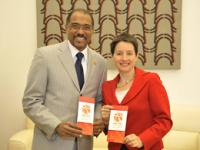
Executive City Councillor for Public Health and Social Affairs of Vienna Ms Sonja Wehsely (right) and UNAIDS Executive Director Michel Sidibé discussed together the forthcoming International AIDS Conference in Vienna. The meeting took place 7 April 2010. Credit: UNAIDS
Mr Sidibé commended the City of Vienna for its leading work on HIV prevention in a meeting with the Executive City Councillor for Public Health and Social Affairs of Vienna Ms Sonja Wehsely, and mentioned with regard to the upcoming AIDS Conference that Vienna “should not only be the bridge between the east and the west but also the bridge between people who have and who have not,” and be an opportunity to bring together minorities. The City Councillor affirmed the importance of making the conference visible in order to show that “the City of Vienna was on the side of solidarity.” Mr Sidibé outlined his priorities, being the virtual elimination of mother-to child-transmission and a strong focus on prevention and “zero new infections”. Another topic of discussion was the planned first participation of UNAIDS at the Vienna Life Ball on 17 July 2010. This is the biggest charity event in Europe supporting people living with HIV and has been running annually since 1993.
In discussions with high-ranking representatives of the Ministry of Foreign Affairs and the Austrian Development Agency, Mr Sidibé highlighted the good cooperation between UNAIDS and Austria in the past and expressed his wish to further consolidate the relationship, encouraging Austria to become a regular donor to UNAIDS.
During his visit, Mr Sidibé also met with the Austrian Action Alliance against HIV and AIDS, an association of over 40 Austrian non-governmental organizations who advocate for a greater involvement of Austria in the AIDS response. Mr Sidibé emphasized the importance to strategically reposition the AIDS agenda, given the need for a prevention revolution and the support of civil society activism. He hoped the Vienna AIDS conference could be a bridge to the upcoming MDG summit in September 2010.
Ahead of XVIII International AIDS Conference UNAI
External links:

Feature Story
New campaign to help prevent mother-to-child transmission of HIV in Lesotho
01 April 2010
01 April 2010 01 April 2010A version of this story was first published at unicef.org
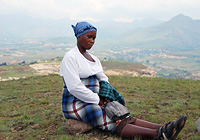
Malekena George heads home from the Pilot Health Clinic in Lesotho’s Berea district after her first antenatal check-up
Credit: © UNICEF Lesotho/2010
Malekena George, from Lesotho’s Berea district, is eight months pregnant, living with HIV, and exhausted from the five-hour trek she endured to get to the Pilot Health Clinic, for her first antenatal check-up. But because her journey to the clinic was so difficult, this visit may also be her last.
Ms. George's first child died at 13 months, and the Lesotho Ministry of Health is working to ensure that her second baby is not born with HIV.
In 2007, the Government, with help from UNICEF and other partners, initiated a massive effort to improve the country's Prevention of Mother-to-Child HIV Transmission (PMTCT) services. To succeed, they needed to ensure that every clinic in the country could provide HIV testing and treatment.
Lesotho leads the way
Lesotho became one of the first countries in the region to allow nurses to administer antiretroviral (ARV) treatments, which greatly expanded access to these critical interventions in the remote areas of the country where fewer doctors are available.
 Malekena George is given her new ‘Mother to Baby Pack’ at the Pilot Health Clinic. The pack includes ARV drugs and antibiotics
Malekena George is given her new ‘Mother to Baby Pack’ at the Pilot Health Clinic. The pack includes ARV drugs and antibiotics Credit: © UNICEF Lesotho/2010
But despite such efforts, major challenges remain, including the fact that many women, like Ms. George, are likely to make only one clinic visit.
This is a typical problem for many health systems in Africa. Though ARV drugs substantially increase the chances that a baby is born free of the virus, providing HIV-positive mothers with the treatment is not easy, especially in remote areas. The combination of distance, lack of transport and poverty prevents many women from making regular antenatal care visits. Such factors also lead many women to drop out of the PMTCT programmes, and to deliver their babies at home without the presence of trained medical professionals.
In a country such as Lesotho, where one in four people is living with HIV, that one antenatal visit has become all the more critical.
Keeping mother and child healthy
Innovative prevention methods are making a huge difference. The Lesotho Government has designed a minimum package for expectant mothers like Ms. George that includes the most effective ARV drugs and antibiotics needed to keep them, and their children, healthy. When they leave the clinic, women are also provided with clear instructions on what medicines they need to take – and when – and what medicines they need to give to their babies after birth.
In an effort to expand this public health innovation ever further, UNICEF and WHO have created a colour-coded take-home box that will be rolled out to five countries in eastern and southern Africa, Lesotho included, by July. Instead of the nurses having to pack all the medicines in small pill bags, this new 'Mother to Baby Pack' clearly separates the ARV drugs and the antibiotics according to when they need to be taken.
"We had to take advantage of the first antenatal visit," said UNICEF HIV and Maternal Health Expert Blandinah Motaung. "In case a woman delivers at home, she will have that package with her."
A dramatic drop in infections
With the new regimen of ARV treatments, and the efforts to facilitate women taking these medicines at home, health experts expect the number of babies born with HIV in Lesotho to drop dramatically.
"The expectation is that with better adherence to treatment and more focus on helping mothers to exclusively breastfeed for six months, we can further reduce the transmission rate to less than five per cent," said Ms. Motaung.
Take home medicine
After her check-up, Ms. George listened carefully to Marethabile Lelia, the clinic nurse, give instructions on the medicines that she would be carrying home. The mother-to-mother counsellor reiterated the importance of sticking to the treatment.
Although Ms. George has another appointment scheduled at the clinic, Ms. Lelia doesn't expect to see her until she returns with a six-week-old for the baby's first round of immunizations and first HIV test - children are again tested at 12, and then 18 months
As she prepared for her five-hour walk home, Ms. George clung to her medicines, understanding clearly that they represented her best hope of ensuring that her baby would escape HIV infection and grow up healthy
Lesotho has the third highest adult HIV prevalence in the world at 23.2%. There are an estimated 270,273 people living with HIV in Lesotho as of end 2007 of which 258,472 are adults and 11.801 children. At the end of 2007, an estimated 3,966 pregnant women with HIV received anti-retroviral treatment to prevent mother to child transmission (PMTCT) of HIV. The coverage of PMTCT programmes has increased from an estimated 5% in 2005 to 42% in the first quarter 2009
New campaign to help prevent mother-to-child tran
Cosponsors:
Partners:
Unite for Children, Unite against AIDS
Multimedia:
Watch video on the ‘Mother to baby pack’ initiative
Feature stories:
UNAIDS and Private sector meet to explore collaboration towards virtual elimination of mother-to-child transmission (16 March 2010)
Global Fund projects that UNAIDS’ call for elimination of mother–to-child HIV transmission by 2015 is within reach (08 March 2010)
Data shows progress needed on HIV testing and treatment for children and mothers (30 November 2009)
Partnering with faith based organizations for virtual elimination of mother to child transmission of HIV (14 October 2009)
More infants protected from HIV as access to antiretroviral drugs to prevent mother-to-child transmission increases (30 September 2009)
Early diagnosis and treatment save babies from AIDS-related death (27 May 2009)
Publications:
Children and AIDS, Fourth Stocktaking Report, 2009
Children and AIDS, Fourth Stocktaking Report, 2009 - Summary
Related

Feature Story
5th Francophone conference on HIV/AIDS in Casablanca wraps up
31 March 2010
31 March 2010 31 March 2010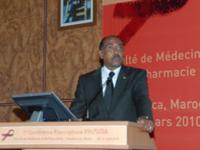
Mr Sidibé delivered an address during the closing ceremony of the conference. 31 March 2010.
While a wide range of AIDS epidemics occur across the Francophone world, this week in Casablanca, countries came together to speak with a common voice and with one common goal – stopping AIDS from making further inroads in French-speaking countries. Representatives from around 50 French-speaking countries wrapped up the 5th Francophone conference on HIV/AIDS today.
“I am impressed by the leadership Francophone countries have shown,” said UNAIDS Executive Director Michel Sidibé, “here in Casablanca we have heard about how French-speaking countries are making important contributions to the AIDS response.”
Mr Sidibé delivered an address during the closing ceremony of the conference. In his speech he said, “In partnership with Francophone countries my dream can become a reality: we can stop all new HIV infections.”
In partnership with Francophone countries my dream can become a reality: we can stop all new HIV infections.
UNAIDS Executive Director Michel Sidibé
During the conference, speaker after speaker highlighted the financial difficulties the AIDS response faced since the global economic crisis. Mr Philippe Douste-Blazy, President of UNITAID, called for a new approach to address funding needs. "We need innovative financing mechanisms to complement classic institutional financing."
It was the first time that the event, which began on 28 March, was held on the African continent. It brought together scientists, policy-makers and health and development experts from more than 40 countries.
"Over the past few days we have had a lot of fruitful exchanges. We have reached some important conclusions, now we must put them into action," said Patrice Debré, French Ambassador in charge of the fight against HIV/AIDS and infectious diseases.
It was also the first Francophone HIV conference in which UNAIDS participated significantly. The Joint United Nations Programme plans to continue this strengthening of cooperation with Francophone countries.
"I see UNAIDS presence here as the start of a new era of deeper collaboration with French-speaking countries," said Mr Sidibé, "We want to give value to their expertise and reinforce experience sharing between nations."
UNAIDS estimates that there were 4.1 million people living with HIV in Francophone countries and 340,000 new infections in 2008. Prevalence rates vary widely: for example Algeria has a rate of 0.1 percent while the Central African Republic has a rate of 6.3 percent.
The next Francophone Conference on HIV/AIDS will take place in Geneva, Switzerland in 2012.
5th Francophone conference on HIV/AIDS in Casabla
Multimedia:
Feature stories:
International consultation on “Positive Health, Dignity and Prevention” in Casablanca (26 March 2010)
Spotlight on human rights at the 5th Francophone Conference on AIDS (26 March 2010)
External links:

Feature Story
UNDP to partner with Sony and JICA in Cameroon and Ghana during FIFA World Cup
30 March 2010
30 March 2010 30 March 2010
Group photo of JICA, SONY and UNDP directors with the Ambassadors of Ghana and Cameroon in Japan
Sony Corporation is partnering with the United Nations Development Programme (UNDP) and the Japan International Cooperation Agency (JICA) to bring health information, with a special focus on HIV, to vulnerable communities in Cameroon and Ghana.
This summer, Sony will set up large screens to live broadcast, for free, approximately 20 FIFA World Cup matches, allowing people in areas where TVs are scarce. Throughout the games, UNDP, JICA and local partners will also be offering viewers HIV counselling and advocacy material as part of their AIDS-awareness campaign called “Public Viewing in Africa”. Both countries’ national football teams will be participating in the World Cup, to be held in South Africa this June and July.
Although football is the most popular and closely followed sport in Cameroon and Ghana, the countries are characterised by low rates of household TV penetration (22 percent in Cameroon, and 21 percent in Ghana) with many people unable to watch football matches on TV and support their home country.
By conducting the joint project during the World Cup, one of the biggest sporting event of the year, the partners aim to attract some 13,000 participants and estimate to provide HIV testing and counselling to around 1,800 recipients.
I am in full support of this framework that provides us with tools for a more professional approach in our work with the vulnerable groups in the community.
UNDP Administrator Helen Clark
“The World Cup brings people together, both as teams, and as nations cheering on their players. The same can be true for the Millennium Development Goals,” said UNDP Administrator Helen Clark. “There can be no spectators in the fight against poverty. Everyone has a role to play in scoring the 8 Millennium Development Goals, which if reached would improve the quality of life for many hundreds of millions of people across developing countries.”
Stopping the rise of AIDS, malaria and other diseases is one of eight key Millennium Development Goals (MDGs) UN member nations are striving to achieve within the next five years. The other goals are to eradicate extreme poverty and hunger; to establish universal primary education; to promote gender equality; to reduce child mortality; to improve maternal health; to ensure environmental sustainability and to develop a global partnership for development.
“I am delighted that Sony can contribute to the prevention of HIV through our partnership with JICA and UNDP, while also delivering great football experiences to the people of Cameroon and Ghana through our cutting-edge technology and sponsorship of the 2010 FIFA World Cup,” said Howard Stringer, Chairman, CEO and President of Sony Corporation.
JICA and Sony conducted a similar joint project in Ghana in July 2009, and it was deemed a great success. Some 9,000 people gathered in seven cities to watch Sony's high-definition broadcasts of football matches, around three times the typical attendance. About 1,100 young people and adults visited the HIV testing sites and took the test and received counselling —again about three times as many people as usual.
UNDP to partner with Sony and JICA in Cameroon an
Cosponsors:
Feature stories:
UNAIDS and Private sector meet to explore collaboration towards virtual elimination of mother-to-child transmission (16 March 2010)
Footballers unite against AIDS (09 December 2009)
Private sector in West and Central Africa explore strategic partnerships for improved health outcomes (27 October 2009)
United for UNICEF: Manchester United visit highlights HIV and rights of vulnerable children (27 August 2009)
Contact:
Sony Corporation Corporate Communications:
Ikuma Nakagawa, Tel: +81-3-6748-2200, sony.pressroom@sony.co.jp
JICA, Office of Media and Public Relations:
Makiko Mitamura, Tel: +81-3-5226-9781, Mitamura.Makiko@jica.go.jp
UNDP Tokyo:
Toshiya Nishigori, Tel: +81-3-5467-4751, toshiya.nishigori@undp.org
UNDP New York:
Sandra Macharia, Tel: +1 212 906 5377, sandra.macharia@undp.org
External links:
Publications:
Joint action for results: UNAIDS outcome framework, 2009 – 2011 (pdf, 915 Kb.).

Feature Story
Partnership with faith organizations vital for effective response to HIV
30 March 2010
30 March 2010 30 March 2010
(L to r): Mr Ahmed Abbadi Secretary General of Rabita Mohammadia des Ouléma from Morocco, Father Hady Aya, an Antonin Maronite priest, and founder of the Organization for Justice and Mercy and UNAIDS Regional Director for West and Central Africa, Mrs Meskerem Grunitzky-Bekele. 29 March 2010, Casablanca, Morocco
Religious leaders and UNAIDS renewed their commitment to collaborate closely in order to prioritize and strengthen the response to HIV. The reassurance of their commitment came during the launch of the French language version of the UNAIDS strategic framework for partnership with Faith-Based Organizations (FBOs) in its response to HIV, that took place at the 5th Francophone conference on HIV/AIDS taking place in Casablanca from 28 to 31 March 2010.
The framework will serve as a guidance for UNAIDS staff to establish and strengthen the collaboration with the religious leaders.
Meskerem Grunitzky-Bekele, UNAIDS Regional Director for West and Central Africa
The framework, launched in English in December 2009, is designed to encourage global and national religious leaders to take supportive public action in the AIDS response and create strong partnerships between UNAIDS and established FBOs working on HIV.
“The framework will serve as a guidance for UNAIDS staff to establish and strengthen the collaboration with the religious leaders,” said UNAIDS Regional Director for West and Central Africa, Mrs Meskerem Grunitzky-Bekele, in Casablanca.
The document details how FBOs can work towards ending stigma and discrimination and help in the inclusion of people living with HIV in the programme design and implementation, as well as research, monitoring and evaluation of programmes and in decision-making processes.
Our presence in the church stresses on our main vocation to defend human dignity and be witnesses for the mercy of God.
Father Hady Aya, Antonin Maronite priest
The religious leaders present at the launch stressed the need to meaningfully engage the people living with HIV and that the faith leaders need to act decisively to protect human rights within their communities.
“Our presence in the church stresses on our main vocation to defend human dignity and be witnesses for the mercy of God,” said Father Hady Aya, an Antonin Maronite priest, and founder of the Organization for Justice and Mercy which works on HIV issues in prison settings in Lebanon.
Muslim leader Mr Ahmed Abbadi Secretary General of Rabita Mohammadia des Ouléma from Morocco welcomed the document. "I am in full support of this framework that provides us with tools for a more professional approach in our work among communities of people vulnerable to HIV".
I am in full support of this framework that provides us with tools for a more professional approach in our work among communities of people vulnerable to HIV.
Mr Ahmed Abbadi, Secretary General of Rabita Mohammadia des Ouléma, Morocco
The launch of the French version of the document was officiated by Father Hady Aya and Mr Ahmed Abbadi. Both religious leaders are active members of CHAHAMA, the First Regional Network of Arab Religious Leaders Responding to AIDS in the Middle East and North Africa region. Mrs Meskerem Grunitzky-Bekele, UNAIDS Regional Director for West and Central Africa represented UNAIDS at the event.
The Framework promotes strengthened links, including coordination and oversight, between UNAIDS and FBOs at the country level to ensure that there is an appropriate interface as part of a comprehensive national AIDS response. UNAIDS will continue to advocate for FBOs and other organizations to be appropriately funded so that they can play a role commensurate with their capacities in supporting the development, implementation, monitoring and evaluation of national AIDS plans.
Partnership with faith organizations vital for ef
Feature stories:
Religious summit engages religious leaders in the HIV response (23 March 2010)
UNAIDS launches framework for partnership with religious organizations (07 Dec 2009)
Developing strategies to work with Faith Based Organizations (10 April 2008)
Hindu faith leaders commit to AIDS response (18 June 2008)
External links:
Publications:
Engaging Faith-Based Organizations for the MDGs: the UN Experience (pdf, 439 Kb.)
Scaling up effective partnerships: a guide to working with faith-based organizations in the response to AIDS
HIV prevention, care and support across faith-based communities






